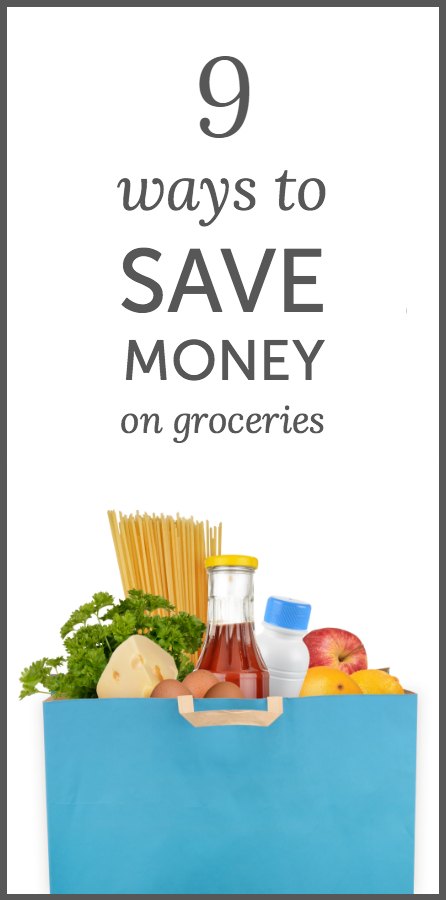We've been making meals at home a lot more lately, so I've been contemplating all things domestic…like ways to save money on groceries.

One of my resolutions this year was to start being a better steward of our money. It's really important to me that the boys grow up with a firm handle on budgeting, so I figure now's the time to start practicing what I preach!
Grocery shopping can be overwhelming, especially if it's not something that's usually party of your routine. They're constantly changing up the layout of the store so you'll inevitably have to do several laps and go back to aisles because you forgot something. You WILL buy more food than you need and wind up with shockingly-inedible things until you figure out a system. Here's a glimpse at the most effective parts of our routine to help you cut costs.

- Have a list when you go in to shop. Write out a chart of what you like to eat for breakfast, lunch, dinner and snacks. Then, write out the ingredients for those meals. Avoid impulse buying. Stick to what is on your list, and look for the cheapest prices on the items you need. Lower-priced items are often placed very high on the shelves and/or very low on the shelves, while the most expensive items are at eye-level. Keep an eye out for generic brands as they are generally less expensive.
- Don’t shop while you’re hungry. I always shop right after I’ve had lunch so I won’t be tempted to buy whatever I'm craving. Also, you’re more likely to try and rush through grocery shopping if you’re in a hurry to go eat, and you’ll miss good deals because you won’t have time to examine prices.
- Shop alone. Don’t bring friends! They will slow you down and try to talk you into buying things you don’t need. Same goes for kids. Paying for a babysitter to watch them while you shop might prove cheaper than bringing them along and struggling through their special requests. Many companies design their packaging with children in mind. They know that parents will bring kids to the store with them and that kids have a certain sway. If you and your spouse or roommate decide to shop together, make it clear that you want to stay within your budget and avoid buying unnecessary items. If you're both really serious about it, you and your partner can act as support for one another and help each other stick to the necessary items.
- Shop only once per week. The fewer trips that you make to the store, the fewer opportunities stores will have to entice you into buying something that you don’t need. Impulse shopping is very costly.
- Shop during off-peak hours. Avoid the store during the weekends and early evenings. If you go when it's crowded, you'll be forced to spend more time in the store and are more likely to get off-track.
- Buy in bulk. Usually the prices are less per ounce. But be careful: just because the packaging for an item is large, doesn’t mean that there is particularly a lot of food inside. Many companies have caught onto the idea that consumers, trying to buy in bulk, go for larger packages. In response, they've made their packaging larger but don’t actually put more food in them. So sometimes a smaller package can be a better deal – compare the amount of food in each package and consider the price per ounce. Most stores list the price per ounce on the price tag.
Also, if you’re buying something like cheese, it is usually cheaper to buy a block of cheese and cut it yourself than to buy pre-sliced cheese. The same goes for fruit, meat, and vegetables. Buy canned juice and mix it yourself. Most stores have a deal where if you buy one galloon of milk, you get the second for less than a dollar. Of course, don’t buy items in bulk that you aren’t going to eat – like gigantic bags of chips that go stale before you finish them and huge amounts of empty-calorie snacks that won’t fill you up. One thousand Otter Pops for $4 may sound like a good deal, but chances are you're going to eat 20 of them and stick the rest in the freezer for a couple months before throwing them out. Be realistic.
- Buy an extra freezer. The best decision I made as a young parent was to buy an extra freezer so that when I happen to see a really good deal on something, I can stock up on it and freeze the excess for later. As you become a more experienced shopper, you learn what an exceptionally good price is and become better at stocking up on food when it's on sale. Once you have this experience, try shopping at several stores in one day – you’ll learn what products you should buy at each grocery store. For example, I buy frozen pizzas at one grocery store because they have the best prices on frozen items, but I go to a different store to buy my produce. Leave this sort of comparison shopping until you feel comfortable making your way around a grocery store.
- Splurge on the items that really matter to you. Buy that slightly too-expensive snack that you love. For example, I absolutely adore jalapeño poppers. One month, I decided that they were just too expensive for a snack that has little nutritional value. It seemed like a good decision at the time. However, I was so used to eating this snack that I would crave it constantly. Since I didn’t have it around my house, I found myself driving to Jack in the Box and picking some up there. So instead of paying ten dollars for a box of forty or fifty, I was paying over a dollar for three of them at a time. I learned that depriving myself of the snacks I really can’t live without winds up being more of an expense in the end. Indulge a little. Choose one or two items that you are willing to spend more money on, and let those be the only exceptions to your otherwise smart and logical budget.
- Look at expiration dates. When you buy milk, always reach to the very back. Stores stock their milk by sliding it in from the back so the freshest milk is always behind the rest. It's generally the same with any item. Stores place the stuff that's closest to expiring in the easiest places to reach in order to get rid of them more quickly. The slight inconvenience of reaching to the back of the shelf will end up saving you a lot of money.
A little forethought can help you save a ton of money on groceries. These tips – taking your own family's habits into consideration – should easily help you cut your costs. Be rational about your purchases. Before you put an item in your basket, ask yourself if it is worth what you are spending and if you really need it!